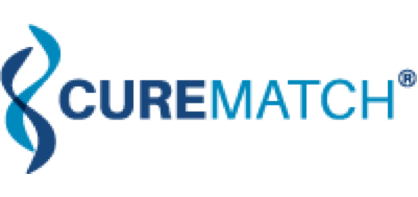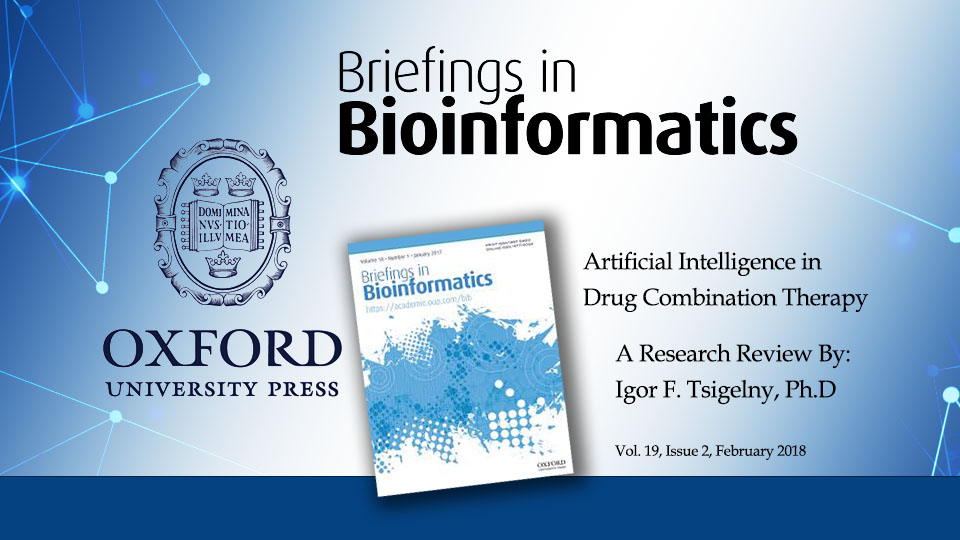Artificial Intelligence Facilitates Drug Combination Therapy Recommendations Bioinformatics Journal
CureMatch’s Tsigelny is a featured author in Briefings in Bioinformatics journal with a review on artificial intelligence’s usefulness in drug combination therapy recommendations.
SAN DIEGO, CA – February 12, 2018: Igor F. Tsigelny, Ph.D., Co-founder and Chief Science Officer at CureMatch®, is the author of “Artificial intelligence in drug combination therapy” in Briefings in Bioinformatics Journal1. This 15-page intensive research review with 137 references explores several artificial intelligence (AI) methods that have been successfully implemented in combination drug therapy including HIV, hypertension, infectious diseases, and cancer. The data clearly shows that rule-based expert systems in tandem with machine learning algorithms poses a promising direction in the field of biomedical informatics and the advancement of combination therapy.
The concept of drug combination therapy has long been a scientific area of interest. Of note, the classical work devoted to the synergism of drugs by Loewe published in 1928 is still being used in calculations for optimal drug combinations. The development of combination drug therapies has been necessitated by the nature of complex diseases. One drug usually cannot target all the necessary points of intervention. For example, oncologists often meet cancer patients with more than five molecular aberrations in their genomic profiles.
In recent years, there has been an explosion of available information related to the biomedical parameters of patients as well as the properties of drugs. Regarding patients, large “-omic” (genomic/proteomic/metabolomic) data sets are now available in addition to the histology, history of treatments, pretreatment state of the organism, etc. Regarding drugs, hundreds of 2D, 3D, and even 4D molecular descriptors for medicines are now available. Further accounting for potential changes to the genetic profile during disease progression, the ability to optimize drug combinations for each patient is rapidly moving beyond the comprehension and capabilities of an individual physician.
Targeted combination therapy is increasingly the choice treatment for many complex human diseases, particularly those resulting from genetic aberrations (such as cancer). However, selecting the most promising combinations for each patient can be a daunting task, especially since combining two or more drugs can often lead to effects beyond the simple addition of their single impacts. Consider a cancer treatment regimen to address six or more specific genetic alterations. Factoring multiple possible dosing regimens, the number of potential combinations rapidly multiplies, achieving numbers as high as 1011. As the number and type of genetic alterations can vary widely from patient to patient, these types of choices must be considered for each individual—extending beyond the capabilities of primary care physicians.
Computational approaches are clearly required in the optimization of combination therapies, and many artificial intelligence (AI) methods are being utilized. Tsigelny describes the main concepts of machine-learning systems as well as deep-learning artificial neural networks towards practical biomedical science applications. The research succinctly addresses the advantages and disadvantages of using different types of artificial intelligence to address specific problems, and in particular combination drug therapy. Machine learning systems in combination therapy should consider compound-related, biochemical result-related, cell-related, and patient-related parameters. Valuable information for beginners and professionals in the field including websites to download or use machine learning programs are presented.
“The future of complex disease treatment is being driven by machine learning across rapidly growing datasets of drug and genomic/proteomic information,” stated Tsigelny. “The one practical way clinicians can distill the overwhelming combination drug therapy options into actionable intelligence for patient care is through artificial intelligence (AI).”
Igor F. Tsigelny is an expert in intelligent computing systems as applied to cancer who guides the development of the CureMatch precision oncology technology. CureMatch’s primary objective is to determine optimal combinations of anticancer drugs. Developing AI machine-learning systems allows CureMatch to score and rank Personalized Combination Therapy® options to improve the precision of cancer treatment recommendations.
###
Journal Reference
[1] Artificial intelligence in drug combinations therapy
Igor F. Tsigelny 1-4*
1 San Diego Supercomputer Center, 2 Moores Cancer Center, 3 Department of Neurosciences University of California at San Diego, 4 CureMatch, Inc.
Briefings in Bioinformatics Vol. 19, Issue 2, February 2018
https://doi.org/10.1093/bib/bby004
About Briefings in Bioinformatics
Briefings in Bioinformatics is an international forum for researchers and educators in the life sciences. The journal will also be of interest to mathematicians, statisticians and computer scientists who apply their work to biological problems. The journal publishes reviews for the users of databases and analytical tools of contemporary genetics, molecular and systems biology and is unique in providing practical help and guidance to the non-specialist in computerized methodology. Papers range in scope and depth, from the introductory level to specific details of protocols and analyses encompassing bacterial, plant, fungal, animal and human data.
About CureMatch®
CureMatch, Inc. is a digital precision oncology company bridging the gap between legacy cancer treatments and advances in personalized medicine. CureMatch scores and ranks Personalized Combination Therapy® options to target specific molecular aberrations in cost-effective PreciGENE reports. This actionable intelligence guides oncologists to effectively customize treatment for each individual patient. Based in San Diego, CA, the CureMatch technology has expert foundation in supercomputing, oncology, genetics, proteomics, biochemistry, and cell biology. For more information, visit www.curematch.com
Media Contact
Name: Larissa Anderson
Company: CureMatch
Phone: 858-859-2873
Email: press@curematch.com

